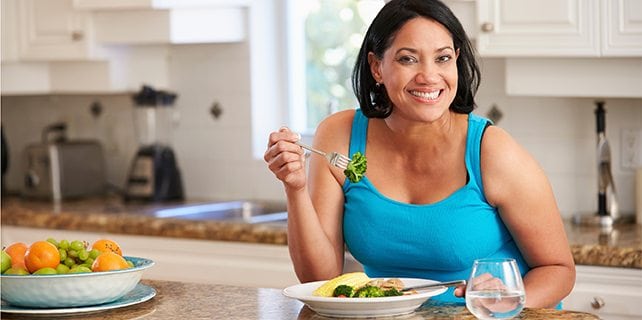Brought to you by Wolfson Children’s Hospital
During the month of October, pink seems to be everywhere you look. From the pink ribbons on lapels to some fuchsia shoes on the feet of our Jacksonville Jaguars players, it is the color that defines Breast Cancer Awareness Month. If you’re under the age of 40, it’s easy to dismiss breast cancer as something you don’t have to worry about yet. But if there are things you know you can do to reduce your lifetime risk of developing it, wouldn’t you like to know what they are?
Current statistics show that one in eight women will develop breast cancer at some point in their lives. So what can you do to reduce the chance that you will? For starters, get out there and move! “We’re still learning how cancer develops, but there’s mounting evidence that losing weight can reduce the risk of breast cancer,” said Jennifer Crozier, MD, a hematologist/ oncologist with Baptist MD Anderson Cancer Center. “Achieving and maintaining a healthy weight can reduce levels of hormones like insulin, estrogens and androgens that are associated with cancer risk.”
People who are overweight or obese have a higher risk of many serious health problems like diabetes, high blood pressure, and heart disease. And those extra pounds also are associated with a higher risk of breast cancer. To help you lower your risk, there are lifestyle changes you can make – different ways to eat and to exercise. Long term, one of the most important changes you can make is maintaining a healthy weight. A guideline for doctors is body mass index (BMI), which is the ratio of a person’s weight and height. A normal BMI is between 18.5 and 24, with 25-29 considered overweight and 30 and higher considered obese. Figure yours out by using this online BMI calculator.
Aside from exercising at least five days a week, what you eat makes a big difference. “A plant-based diet can contribute to lowering the risk of cancer,” said Dr. Crozier. “This consists primarily of fruits, vegetables, beans/legumes, nuts/seeds and whole grains. The Mediterranean diet is based on vegetables, fruit, fish and olive oil. Both have been associated with a decreased risk of breast cancer.”
Even if 40 is several years away, you should still get an annual checkup with your primary care physician or gynecologist that includes a clinical breast exam, and be aware of changes in your breasts like unusual swelling, dimpling, redness or irritation of the skin or unusual discharge from the nipple. Once you hit the big 4-0 (earlier if you have a family history and your doctor recommends it), it’s time to start your annual mammograms.
Most cancer specialists agree there are other factors that may contribute to the risk of breast cancer. These include the use of tobacco, excessive alcohol consumption, having dense breast tissue, prolonged hormone replacement therapy and having a family history of breast cancer. With that in mind, where’s the best place to start? Simply be more mindful of what you’re eating, and get some regular exercise.
“You can help lower your risk by eating and exercising differently now,” said Dr. Crozier.
| For more information about breast cancer screenings, risk factors and types of breast cancer, you can visit Baptist Health. For information on digital breast imaging, please call 904.202.2222 or go here.
Take the quiz and find out what you know about breast cancer! |


















